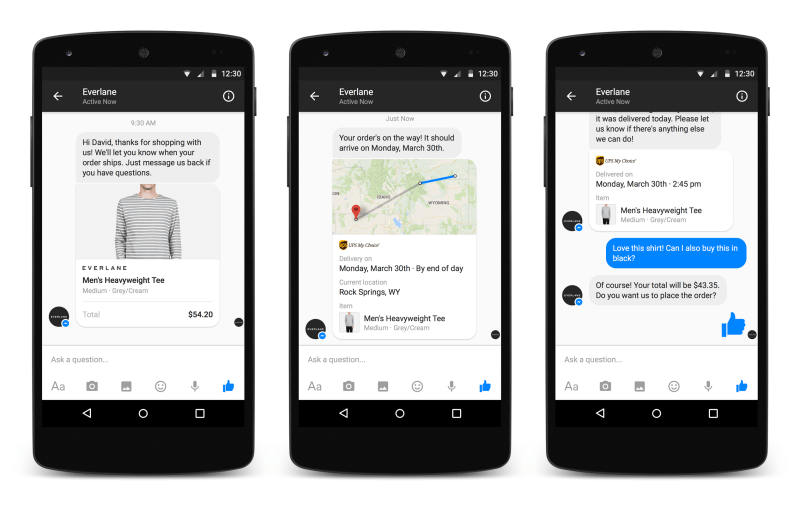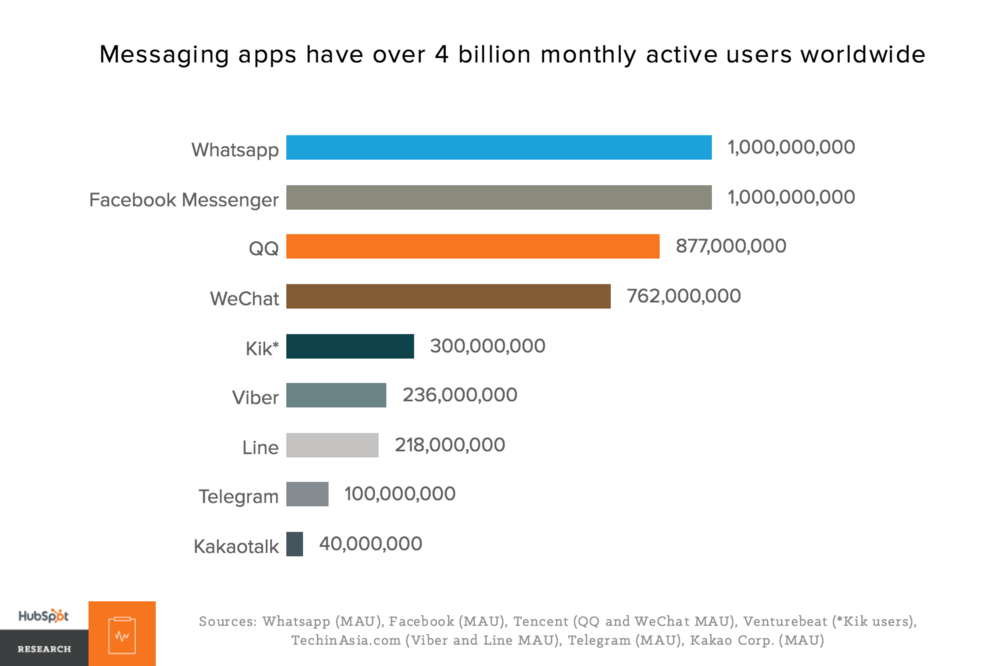Facebook Bets Big on Bots with Messenger Platform

With a billion people using Facebook Messenger – and Zuckerberg’s public promise that Messenger will make sure you “never have to call 1-800-FLOWERS again” – will Facebook’s newest platform prove that bots are hot… or not?
In April 2016, Facebook unveiled a brand new Messenger Platform, offering developers the opportunity to build solutions for many Messenger users around the world. Facebook’s Developer Blog[1] clearly articulated the enormous opportunity ahead: “Build just one bot, and your experience is available on all platforms where Messenger exists, including iOS, Android, and web. It also removes the friction of your users having to download one more app [and] Messenger is now used by 900 million people every month[2].”
Though Messenger launched in 2011, the product first began to achieve meaningful growth in 2014, when the messaging feature was pulled out of the core Facebook experience. Users were forced to download Facebook’s standalone Messenger app in order to send private messages on mobile[3]. Establishing messaging as a feature independent from Facebook was the company’s first critical step – coupled with its acquisition of WhatsApp six months earlier[4] – toward taking on messaging incumbents like WeChat, KakaoTalk, and Line. The only way Facebook could compete with the world’s most established messaging players was to pull as many users as possible into Messenger, decoupling the action of logging in to check Facebook (which a user could do every day, once a month, or very infrequently) and chatting with a friend using Facebook (an activity that increases the likelihood of regular engagement).
Messenger Platform is not Facebook’s first platform business: in fact, Facebook’s very first platform launched 10 years ago[5] alongside a flurry of alpha partners that included Amazon, Washington Post, and Red Bull, all of whom developed platform apps for the occasion. Five years later, in 2012, the company released its Open Graph API[6] to allow brands, websites, and services to share a user’s actions into News Feed (e.g., “James ran 3.51 miles with Nike.”), effectively creating another platform for third-party developers.
Is Facebook Messenger the “killer platform” in the company’s series of well-intentioned attempts in games, publishing, and customizable Pages? Why would Facebook consider a messaging-specific platform important when its core product (Facebook.com) already boasts more than 1.2 billion DAU[7]?
Creating Value
Messenger Platform creates value for users and companies through its third-party apps – specifically bots – that developers can build easily and launch through Messenger. Bots can be customized, provide automated updates on online orders, and allow people to efficiently interact with businesses for customer support.
For example, a person thinking about taking a trip could use a Messenger bot to help find flight times, hotels, or local attractions:
https://www.youtube.com/watch?v=A3r72C4PM1s
As of July 2016, more than 33,000 bots had been developed for Messenger[8]. Bots are able to “link Messenger profiles to customer accounts, such as a bank or online merchant”. Companies are using Messenger bots to their advantage, giving their brands a voice and a powerful way to connect with users in real-time. For example, Burger King created a bot[9] that allows people to order from the menu, pay through the app, and shares which restaurants are nearby – all without leaving the Messenger experience:
Capturing Value
Messaging apps have a huge and highly engaged base of users, with over 4 billion MAU of messaging apps worldwide[10]. WeChat, for example, allows users in China to send payments effortlessly, while also making it possible to shop online without ever leaving the app. By making it extremely easy for anybody to do anything on their mobile device – from running an errand to making plans with a friend – network effects become stronger. Eventually, users become locked into the platform – the cost of switching becomes too high.
By launching Messenger Platform, Facebook benefits from the entrenched network effects of its core business. The social network is leveraging its established user base to move into a high network effects / high multi-homing business while at the same time, using the platform as a way to onboard both Messenger holdouts and businesses. Network effects are making it possible for Facebook to take what was originally just a feature of its main product – messaging – and create a brand new business model poised to compete against today’s largest messaging companies and ready to be monetized through News Feed.
[2] As of July 2016, Facebook Messenger is used by over 1 billion people





Libby – this is a fascinating take on Facebook messenger’s value-add, especially in the developer ecosystem of bots. We all benefit from smarter and more comprehensive responses to customer service, etc, so I completely get the B2C and B2B value FB messenger provides!
I am wondering what Facebook’s strategy is around its simultaneous development of WhatsApp and messenger. It’s interesting to me that the two don’t have many discernible differences in their products (other than UI, and a few other things). And yet, I haven’t heard much about bot development, AI, e-commerce, etc happening on WhatsApp versus a clearly active strategy for messenger to go after those markets. Does Facebook assume that multihoming will be taking place on both of those platforms anyway, and so they are hoping for product differentiation? Or do you see a world in which one gets folded into the other and they try to combine forces on 1 platform in order to be everything to everyone? I am a personal user of both, but could see either scenario unfolding.
Hello! Thanks for the thoughtful Qs.
“We think that the bigger opportunity to go after is to provide our community with both tools rather than try to combine them together and try to make it one size fits all.” – Zuckerberg on WhatsApp & Messenger
It seems like people get different things from Messenger and WhatsApp, so there was likely some strategic advantage to keeping the two distinct for at least the first several years after the WhatsApp acquisition and the continued development of Messenger. I don’t actually think it was obvious back in 2014 (when WhatsApp was acquired) that Messenger would take off the way it has (good article on this here: https://techcrunch.com/2016/07/20/one-billion-messengers).
I think this all comes down to product differentiation and multihoming, as you suggest. My understanding on WhatsApp is that people use it – and trust it – for their private conversations. My sense is that people do not have the same perception about Facebook, especially since Messenger chats are mined to target ads. Zuckerberg has said that the plan not to combine the two is international; that the messaging space is very large so even in countries where one of the two apps is growing fastest, the other one is also growing quickly as well. He’s said “WhatsApp is much more utilitarian… very basic and focused just on the feed and having a simple tool that people can use.” while he’s described Messenger as “more focused on expression and creativity.”
Despite the desire to keep things separate, WhatsApp recently updated its privacy policy to link WhatsApp accounts with Facebook accounts for the first time. It appears that Facebook is exploring ways for businesses to connect with people through WhatsApp in a non-spammy way, so it will be interesting to see how that unfolds – new enterprise platform? (http://www.businessinsider.com/whatsapp-enterprise-platform-for-businesses-already-in-app-2017-1).
Hi Libby. Thanks for the great post! I think Facebook decided to carve out Messenger functionality from the main Facebook app because the main FB app was becoming “too big and complicated” and was trying to solve too many functionalities. Do you think Messenger is also moving down a similar path now? It has the core messaging functionality and as you mentioned in your post it has become a platform too (containing bots as well as sticker apps etc.). I think Facebook also has plan to launch its virtual assistant technology “M” within Messenger for all users (http://www.theverge.com/2015/10/26/9605526/facebook-m-hands-on-personal-assistant-ai). Do you think that even Messenger will become complicated enough to be split into smaller apps/ platforms in the future?
Hi Bipul! Thanks for your thoughtful comment. I think you are right that one of the reasons to carve Messenger out of Facebook is bc the core product was becoming very complicated – even so, I think that one of the main drivers behind the decision was to grow Messenger without forcing people to use Facebook, thus opening the Messenger platform up to anybody in the laggard cohort with a phone number, even if he/she does not want to have an account on Facebook. This holdout group is important especially as messaging is projected to become more significant than traditional “social networking” in the coming years.
I think now is probably the time to test which features are particularly sticky on Messenger. FB has been testing M.ai for a while but only a couple months ago began testing “M suggestions” which use context from conversations in the app to suggest the right things. M is still in small scale testing and this is the early days of Messenger bot integration. My take is that Facebook will use this opportunity to observe user behavior, determine which in-app capabilities are most beneficial, and phase out the ones that are used less frequently before spinning Messenger off into multiple platforms. I could see a world where M.ai is its own “thing”, but FB would need to know more about why people are using M and how they are using it before that would happen.
I liked your post on FB’s ad platform. I’m sure you’ve been following some of the more recent critiques on FB ad measurement in the last few months/years, with the company admitting to overstating video views back in September and some of P&G’s more recent public feedback. (https://www.nytimes.com/2017/02/10/business/media/facebook-takes-steps-to-improve-advertising-data-after-criticism.html).
Thanks Libby! I think your point about Facebook using Messenger as an “experimental” platform for testing out new features make complete sense! Probably that is why they are not experimenting that much with Whatsapp so as to at least preserve one messaging platform in its pure form. Overall I feel that the future of Messenger platform seems very exciting given the move into VR. I think Zuckerberg demoed how Messenger could be used for a video call inside Oculus and I am sure the bots that you mentioned in your post will also evolve to take advantage of the VR environment.
Regarding your comment on FB’s ad platform: I agree that critiques of FB’s ad platform has been increasing. But this is something not unique to FB but is true of online advertising in general. Online ads will definitely face a lot more back lash in the future (as we can already see from the rapid rise in Ad blocking), but I feel FB is best positioned to still succeed given its strong control on both the platform as well as the inventory base (captive FB properties)